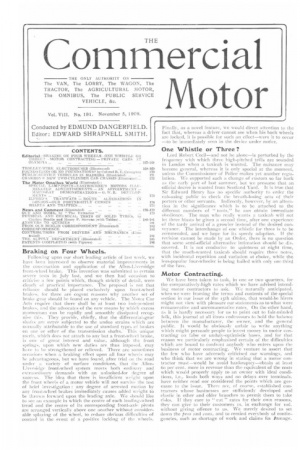One Whistle or Three ?
Page 1

If you've noticed an error in this article please click here to report it so we can fix it.
Lord Robert Cecil—and not he alone—is perturbed by the frequency with which three high-pitched trills are sounded in London when a taxicab is wanted. Tile nuisance may become general, whereas it is only special at the moment, unless the Commissioner of Police makes yet another regulation. We supported such a change of custom so far back as the early part of last summer, but we presume that an official decree is wanted from Scotland Yard. It is true that Sir Edward Henry has no specifir authority to order the cab-using public to check the breath-losingacts of their porters or other servants. Indireelly, however, by an alteration iii the significance which is to be attached to the different numbers of " toots," he can obtain immediate obedience. The man who really wants in taxicab will not let three blasts be given a second thee, after one experience of the tardy arrival of a growler instead of the desired conveyance. The interchange of one whistle for three is to be commended, and we hope for its speedy adoption. If the revision cannot be made by an Order, there is no question that some semi-official alternative iniimation should be dis_ covered. It is not conducive to quietness at night time,_ hat the much-wanted taxicab should require three notes, with incidental repetition and variation at choice, while the less-popular four-wheeler is being hailed with only one third of the fuss,




















